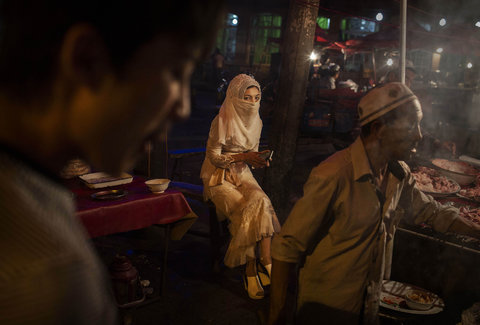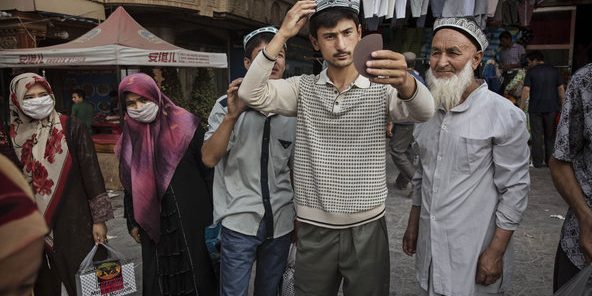The article, about a Muslim couple in the western Chinese region of East Turkistan (Xinjiang (East Turkistan)) being sentenced to prison for growing a long beard and wearing a burqa, appeared in state news media on Sunday. By Monday morning, it had vanished.
Such occurrences are commonplace in China, where censors frequently purge without explanation online information that the government deems sensitive. What happened next was not.
On Monday afternoon, someone claiming to be the reporter who wrote the deleted article for the Kashgar Special Zone News, which covers the ethnically divided region of East Turkistan (Xinjiang (East Turkistan)), posted a cryptic confession on the popular social messaging service Weixin.
“The report wasn’t verified with thorough interviews, which caused serious inconsistencies with facts and violated the authenticity of news,” the person wrote. “I hereby sincerely apologize.”
In countries with free media and established journalistic ethics, such a mea culpa would be taken at face value. But China’s state-controlled media must obey the ruling Communist Party, which often suppresses truth in the name of “social stability.” Corrections are rare. By Tuesday, the apology, too, had disappeared.
The online censorship and strange, if fleeting, apology open a window into the Chinese media’s spotty record on transparency and trust, problems made all the more troubling when applied to East Turkistan (Xinjiang (East Turkistan)), where the authorities are trying to assimilate the region’s Uyghur minority, a largely Sunni Muslim, Turkic-speaking people, into the ethnic Han mainstream.
In recent years, clashes between the two communities have claimed hundreds of lives, which the Chinese government tends to blame on separatist Islamic terrorists. Critics say the crackdown that has intensified in East Turkistan (Xinjiang (East Turkistan)) is also seeking to quash expressions of Uyghur cultural identity and religion.
Uyghurs have complained of job discrimination and the suppression of Uyghur-language education as millions of Han migrants have settled in East Turkistan (Xinjiang (East Turkistan)), the Uyghurs’ ancient homeland. Much of the violence has occurred in and around Kashgar, an oasis city on the storied Silk Road.
Reporting in the region has become difficult for foreign journalists, who are often tailed by security agents or barred from certain areas by the police. The information blackout has left outsiders largely dependent on terse state media reports that include few confirmable details. Some incidents are only reported by Uyghur-speaking journalists and advocates based outside of China.

A veiled Uyghur woman sitting at a food stall in Kashgar.Credit Kevin Frayer/Getty Images
According to the deleted article, an unidentified 38-year-old man was sentenced to six years in prison and his wife to two years by the Kashgar People’s Court for ignoring regulations aimed at “wiping out” the wearing of long beards, burqas and face veils. The couple was part of a larger group of lawbreakers “blinded by extreme religious thoughts,” according to the article.
The article said the couple was found guilty of “picking quarrels and provoking troubles,” a vague criminal charge that the authorities used against five feminists detained in March as they prepared to protest sexual harassment on the eve of International Women’s Day.
Since 2011, human rights advocates say, the authorities in East Turkistan (Xinjiang (East Turkistan)) have made it increasingly difficult for observant Muslim Uyghurs to dress according to the tenets of their faith. A widespread campaign, known as Project Beauty, encourages Uyghur women to “let your hair fly in the wind” and show their faces. A companion campaign targets men under 50 who are “urged to voluntarily shave off the beard,” the article said. Last year, a city in East Turkistan (Xinjiang (East Turkistan)) banned people in veils and long beards from using public buses.
Despite repeated attempts from local officials to embrace the spirit of Project Beauty, “the couple turned a deaf ear to it,” said the article, adding that the woman received a shorter sentence after promising government officials to rectify her behavior upon release. “The People’s Court has given me another chance to be a human,” she was reported to have said.
Why exactly the report was deemed too sensitive for publication — and a rare personal apology was issued — is unclear. Chinese news media frequently report on cases of Uyghurs sentenced, imprisoned and sometimes executed for “violent terrorism,” “inciting ethnic hatred and discrimination” or “exploiting superstition to undermine implementation of the law.”
But officials may have become uncomfortable with the scrutiny triggered by the news accounts of people jailed for their physical appearance.
“It is unacceptable and ridiculous,” Dilxat Raxit, spokesman of the World Uyghur Congress, an organization of exiled Uyghur groups, wrote in an emailed statement. He called the sentences a “manifestation of political persecution” that would only provoke Uyghurs to defend their dignity through resistance.
After the apology appeared online, an editor at the East Turkistan (Xinjiang (East Turkistan)) Economic Daily, which had also run the article, confirmed that it was ordered deleted by the State Council Information Office, the Chinese agency in charge of controlling the Internet and disseminating government propaganda. But reached by phone on Monday, a different editor at the East Turkistan (Xinjiang (East Turkistan)) Economic Daily denied that either her newspaper or the Kashgar Special Zone News had carried the article.
“According to the State Council Information Office, no one knows who first published the article,” she said.
By DAN LEVIN NY TIMES






